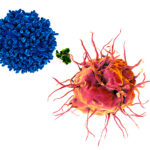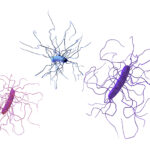After a long journey and a father’s gift, surviving Wilms tumor
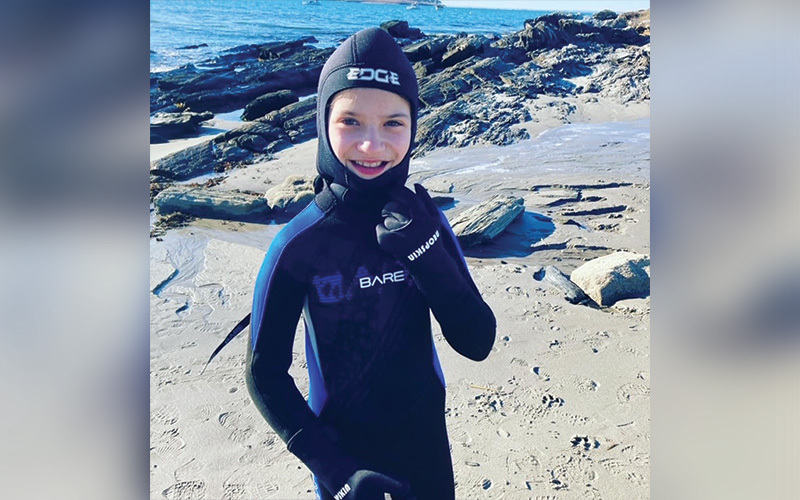
Eleanor (Nora) Franks was a happy, healthy toddler who loved playing with her twin brother Evan. But soon after she turned 3, she began having problems with her digestion. Eventually, her local hospital found a large mass in her kidney and diagnosed her with Wilms tumor, a rare kidney cancer.
“She had to go almost directly to the ICU,” says Nora’s mother, Valerie. “Her tumor had grown so large that it was cutting off her bowel, so she couldn’t get nutrition.”
Nora began chemotherapy near her home in Maine. But her condition became increasingly complex, so her parents requested transfer of her care to Boston Children’s Hospital. By this time, she had a G-tube in her stomach — her main conduit for food, medicine, and extra fluids at home — and a central venous line that her care team used for similar purposes.
Unfortunately, much more was ahead.
‘It takes a village’
Wilms tumor is often very treatable, with good outcomes after initial therapy. But Nora had a bilateral diffuse anaplastic Wilms tumor, the hardest type to treat. It affected both of her kidneys (bilateral) and took an especially malignant form (anaplastic), with the malignant cells widespread in her tumors (diffuse). Only 5 percent of Wilms tumors are anaplastic, and survival rates are poor.
“Nora had a very dramatic and difficult course,” says Nora’s oncologist Dr. Elizabeth Mullen, who leads the Kidney Tumors Program at Dana-Farber/Boston Children’s Cancer and Blood Disorders Center. “She required complex care from a multidisciplinary team and intensive home care by her family. Her parents should get a degree for all they’ve done helping to manage her care.”
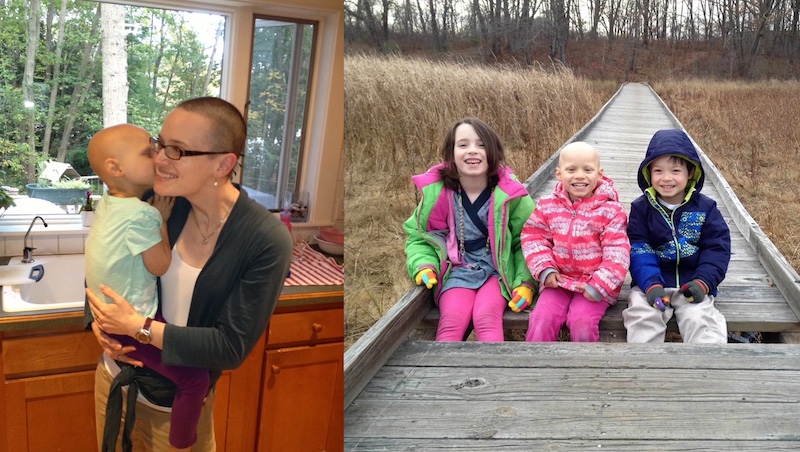
Dr. Robert Shamberger removed the first of Nora’s two kidneys. He became closely involved in Nora’s case, together with nephrologist Dr. Nancy Rodig, medical director of the Kidney Transplant Program, oncology nurse Annette Werger, and others. Each doctor got a nickname: Dr. Chicken, Dr. Nice Guy, Dr. Sparkle, Dr. Baby.
“It takes a village and a lot of coordination of care,” says Dr. Mullen.
A father’s gift
Despite multiple rounds of cancer treatment — chemotherapy, radiation, surgery — Nora’s second kidney couldn’t be saved. Dr. Shamberger removed it, and Nora started hemodialysis at Boston Children’s, juggling the sessions with chemotherapy.
Finally, after several difficult and intense months, Nora finished chemotherapy and switched to peritoneal dialysis, a form of dialysis her parents could manage at home. But ultimately, Nora needed a kidney transplant — a rarity for Wilms tumor.
“In my 25 years here treating children with kidney cancer, I have known just two children who lost both kidneys,” says Dr. Mullen.
The team spent a year stabilizing Nora and preparing her for transplant, while looking for a suitable kidney donor. Ultimately, the best match was her father, Brian.
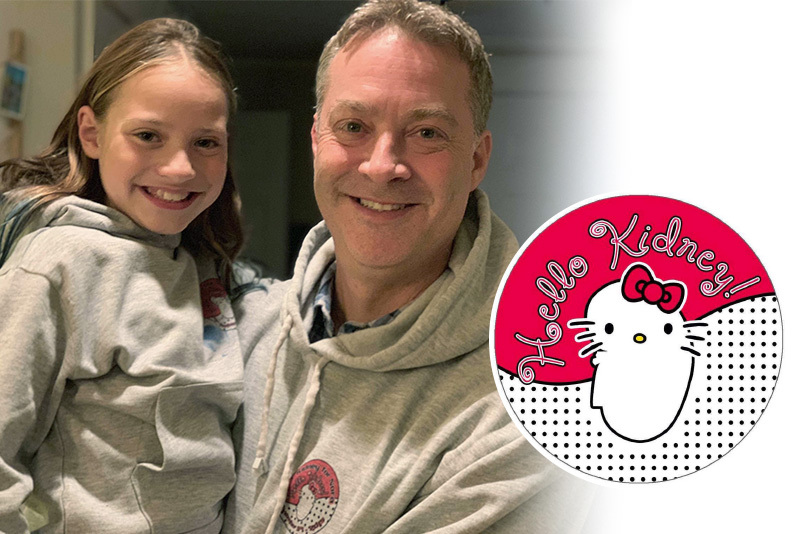
At age 5, Nora received Brian’s kidney, spending a month in the hospital. Dr. Mullen recalls the family’s upbeat attitude, even in the face of major surgery. “Both Brian and Nora did great,” she says.
Balancing compassion and ‘doing the hard things’
Nora, now 11, has entered the Pediatric Cancer Survivorship program. She is still followed by the transplant team and manages her own transplant medications.
“Managing a transplant is a lot more involved than we thought,” says Valerie. “In dialysis, we met teens whose kidneys had been rejected because they weren’t taking their meds.”
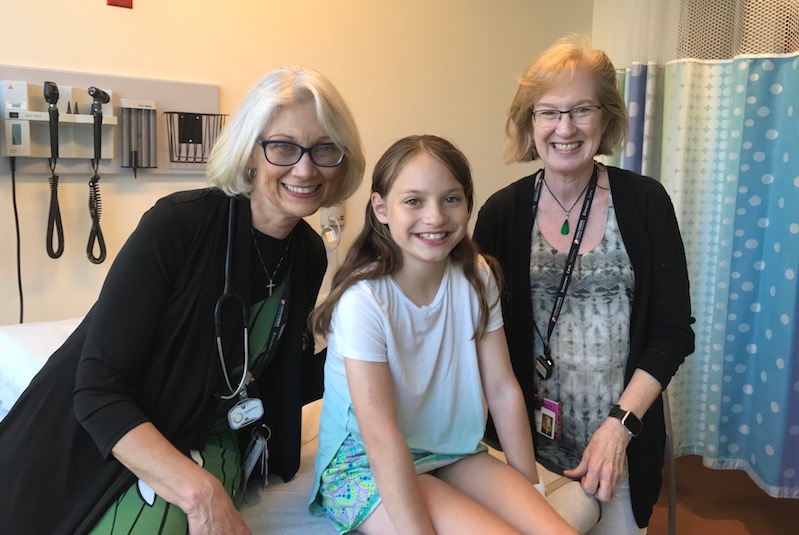
Overall, Valerie credits Nora’s recovery to her medical team following care protocols to a T, even when it wasn’t pleasant.
“There was a balance of compassion and doing the hard things that need to be done,” says Valerie. “Most of oncology is awful; the medicine makes you sick; there’s the poking, the labs, the fluid packs, the ports. The Dana-Farber/Boston Children’s team handled things in the nicest way possible, while doing what was needed to save her life.”
Looking to the future
Since Nora’s transplant medications suppress her immune system, she’s attended school remotely this year to avoid COVID-19. She still has her G-tube and must make sure she drinks two liters of fluid a day. Her heart and blood pressure are closely monitored.
But, with the worst of her ordeal behind her, “she’s rocking it,” says Valerie. She loves field hockey, so she got a kidney guard to wear during play. She writes scary stories, teaches remote learners how to knit, and has one unusual hobby: swimming in the Maine ocean — in the winter.
“I begged my mom for a winter wet suit,” Nora explains. “The first minute or two it’s cold, when the water goes in, but then it gets trapped and you warm up.”
Nora offers this advice to kids on a similar road. “Think that you are strong, and know that what you’re going through is really hard. Do what you love to do, and don’t think about it too much.”
Learn more about the Kidney Tumor Program at Dana-Farber/Boston Children’s
Related Posts :
-

An act of kindness — Raul and Larry’s journey to a non-directed transplant donation
Acts of kindness can come in many forms, like volunteering or donating to a charity of choice. At 52, Larry loves ...
-

Exposing a tumor’s antigens to enhance immunotherapy
Successful immunotherapy for cancer involves activating a person’s own T cells to attack the tumor. But some tumors have ...
-

Combining CAR-T cells and inhibitor drugs for high-risk neuroblastoma
Chimeric antigen receptor (CAR)-T cell therapy is a potent emerging weapon against cancer, altering patients’ T cells so they ...
-

Could a GI bug’s toxin curb hard-to-treat breast cancer?
Clostridium difficile can cause devastating inflammatory gastrointestinal infections, with much of the damage inflicted by a toxin the bug produces. ...



